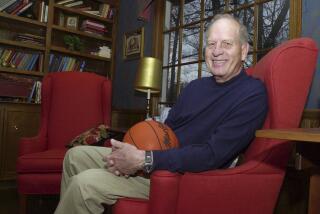Of Course, There Was Only One Way to 100
- Share via
Al Attles likes to remember it this way: “Let’s see, March 2, 1962--that’s the night Wilt and I combined for 117 points, wasn’t it?”
It was, Chamberlain getting 100 of them. And it’s still true that not since that night in Hershey, Pa., have any two players on the same NBA team combined for 100 points.
On that night, before 4,000 fans, Wilton Norman Chamberlain, the Babe Ruth of his sport, had his greatest night. Hey, he had basketball’s greatest night.
This wasn’t Bevo Francis scoring 113 against Hillsdale College or Frank Selvy getting 100 for Furman against Newberry.
This was against the New York Knicks, who double- and triple-teamed the 7-foot-2 Chamberlain. He made 36 of 63 shots and, most amazing of all, the notoriously poor free-throw shooter was 28 for 32 from the line.
He had 23 points in the first quarter, 41 by halftime and 69 after three quarters. With 2:28 to play, he had 90. The 100th point, of course, was a slammer, with 46 seconds left. Chamberlain’s Philadelphia Warriors won, 169-147.
When the Knicks wised up late in the game that Chamberlain wanted 100, they five-teamed him, not even bothering to cover the likes of Attles, who was eight for eight from the floor.
Attles, now the Golden State Warriors’ assistant general manager, recalls it as just another Wilt Chamberlain game.
“Remember, he averaged 50 points a game that year,” he said.
“So when someone said he had 80, then there was a conscious effort to get him the ball every time down.”
When Chamberlain retired in 1973, he’d had 118 50-point games, and in that 1962 season, he did it 45 times. His 59 after halftime that night in Hershey is still the record for most points in an NBA half.
Also on this date: In 1969, at Boston Garden, Phil Esposito became the NHL’s first player to reach 100 points in a season. . . . In 1940, at Santa Anita, Seabiscuit won the Santa Anita Handicap in his last race. Seabiscuit was retired to stud at Willits, Calif., where he died in 1947. . . . In 1964, Sandy Koufax, after a protracted, bitter dispute with Dodger management, signed a $70,000 contract.
More to Read
Go beyond the scoreboard
Get the latest on L.A.'s teams in the daily Sports Report newsletter.
You may occasionally receive promotional content from the Los Angeles Times.










